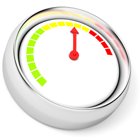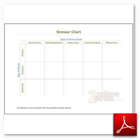Stress Type Test
Remember
This test is only one of many
This stress type test is designed for you to see what pattern of stress behavior you have. It is known that people react differently to stress in their behavior and also that behavioral patterns can actually cause stress.
Take the test to see if you are prone to stress from your behavior or not!
The stress type test will tell you whether you are mostly type A or type B! Read the questions below, and pick the button that you feel best describes you for each of them.
Stress Behavior Type Test
Remember, that this test is only a guide. Stress is individual.
About the test
The test that I have made available above was created by as a Type A behavior rating scale by Bortner, R. W in 1969, as a tribute to the science spurred mainly by Jenkins, Rosenman and Friedman. These authors first introduced the labels of "types of behavior" to try and gauge how much behavioral patterns affect the level of stress and stress related diseases in individuals. It is important to know, that the authors did not intend the type to be confused with personality types, however, this has in many cases been the case. Bortner introduced the shorter, self-selection scale as a more time saving approach, whereby subjects pick for themselves the best fitting characteristic. In the original state, the stress type test is done through structured interviews with patients/subjects - this means that a researcher interviews the subject from a series of questions and then logically deducts the behavioral pattern for that person. On this site, I have included only a "mostly type a"-category and "mostly type b"-category, along with a neutral midt point. I have done this, because I do not feel that a single number is very helpful and many obsess over number easily. Furthermore, I cannot give advice based upon a number. Rather I believe that the stress type test I have constructed here provides a more useful answer, for two reasons: 1) I person who scores a clean A type, is by definition at high risk for heart diseases (according to the studies), and I do not think that such information should be given by anybody but a qualified physician who knows the persons' medical history. 2) A person scoring a clean B is by definition very unlikely to have a lot of stress; but this is only in a behavioral sense. That particular person does not have a behavior to stress her/him-self. But stress can arise from a lot of things, and this test only gives a rough measure of one of them. By this logic, I have kept the test on a reasonable level in a way that hopefully will bring more constructive information than not. The main drawback of the stress type test is the fact that one has to self-select all the items. Self-perception can be very skewed in both way, and therefore the test's results should be taken as guidelines only.

